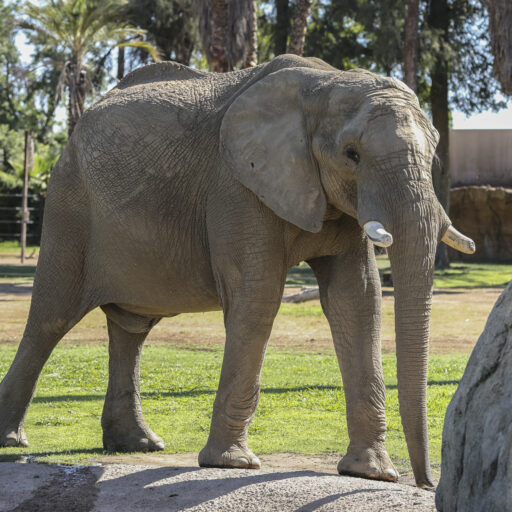
Vusmusi
San Diego Zoo (San Diego, CA)
Vusmusi (also known as Moose and Musi) is a 20-year-old male African elephant. He was born in the San Diego Zoo Safari Park to an elephant named Ndulamitsi, who was pregnant with him when she was imported to the US from Eswatini in 2003 despite global public outcry. Vusmusi was held captive at the Fresno Chaffee Zoo from 2015 to 2022, when he was transferred back to the San Diego Zoo Safari Park in Escondido, CA. In 2024, he was again subjected to a traumatic transfer and relocated to the San Diego Zoo in San Diego, CA. Vusmusi is currently confined with 3 other elephants, who all suffer from their facility’s lack of sufficient space and from being unable to engage in their natural behaviors.
Vusmusi's Story
Vusmusi (also known as Moose and Musi) is a 20-year-old male African elephant. He was born in the San Diego Zoo Safari Park to an elephant named Ndulamitsi. His mother was pregnant with him when she was imported to the US from Eswatini in 2003 despite global public outcry and with zoo and Eswatini officials making misleading claims about the elephants needing to be killed otherwise. The identity of Vusmusi’s father is unknown, but he was not one of the elephants imported with his mother.
Vusmusi lived with his mother, half-brother Lutsandvo (who is now held captive at the Birmingham Zoo), and several other elephants until he was transferred to the Fresno Chaffee Zoo in 2015 at the age of 9. In the wild, male elephants stay with their familial herd until they are older and join all-male herds, typically led by a mature bull elephant.
When Vusmusi arrived at the Fresno Chaffee Zoo, he was held captive with African elephants Amy, her daughter Miss Bets, and an Asian elephant named Kara. Sadly, all three of the elephants who Vusmusi initially lived with were dead by 2019–Kara was euthanized at age 42 due to pain from chronic osteoarthritis, Amy was euthanized at age 30 due to mobility issues, and Miss Bets died at age 11 due to EEHV (Elephant endotheliotropic herpesvirus).
At the Fresno Chaffee Zoo, Vusmusi was confined to a barren four acre-yard, which he shared with the other elephants held captive with him. The elephant enclosure and barn are only a few hundred yards from railroad tracks on which freight trains frequently pass. The zoo used Vusmusi in “keeper chats,” where he was corralled to a tiny pen with bars and made to perform various movements on command, such as lifting his foot or putting his ear through an opening in the bars.
In 2017, after he cracked and broke his tusks numerous times, the zoo had metal covers made for them, which other zoos have also done. “He had a history of being tough on his tusks, and he would break them on things,” Fresno Chaffee Zoo’s curator for elephants told the Sacramento Bee in 2017. Dr. Keith Lindsay, an elephant expert, says this behavior is “an unnatural behavior indicative of stress and/or boredom” (elephants living freely in their natural habitats use their tusks “to pry bark off trees or dig for roots, and in social encounters as an instrument of display or as a weapon”).
In 2018, African elephants Nolwazi and her daughter Amahle were transferred from the Dallas Zoo to the Fresno Chaffee Zoo. Vusmusi frequently interacted with Nolwazi and Amahle. According to the AZA’s 2020 African Elephant Breeding and Transfer Plan, while at the Fresno Chaffee Zoo, Vusmusi was being trained for semen collection to be used to artificially inseminate female African elephants.The zoo attempted to breed Vusmusi with Nolwazi and Amahle but were not successful in their efforts.
In May 2022, the Nonhuman Rights Project brought a habeas corpus case on behalf of Vusmusi, seeking to have his right to bodily liberty recognized and for him to be transferred to an accredited elephant sanctuary that would allow him to exercise his autonomy. In November 2022, upon the recommendation of the AZA, Vusmusi was transferred back to the San Diego Zoo Safari Park. At the San Diego Zoo Safari Park, Vusmusi was held captive with his mother, 5-year-old half-brother Umzula-Zuli, and six female elephants.
In March 2024 it was announced that Vusmusi had once again been moved, this time to the San Diego Zoo where is he held captive with three other elephants. In less than ten years, Vusmusi has been forced to endure three traumatic transfers which entail him being place in an industrial crate and loaded onto the bed of a truck with a crane.
Had the San Diego Zoo Safari Park not imported his mother, Vusmusi would have been born in the wild and likely would be roaming with an all-male herd and experiencing the richness of elephant life. Instead, he remains a prisoner in the AZA zoo system. May he one day find freedom at an elephant sanctuary.
Take action today
A future where no elephant has to endure the traumas of being torn from their families and natural habitats, bred against their will, and shipped from zoo to zoo is possible, and we need your help to make it a reality.
Submit Information
Do you have a tip for us? The Free to be Elephants project relies on our supporters to keep us up-to-date with the latest news, updates and photos about elephants in their local facilities. Use this form to submit your info and help us expose the reality of elephant captivity across America.